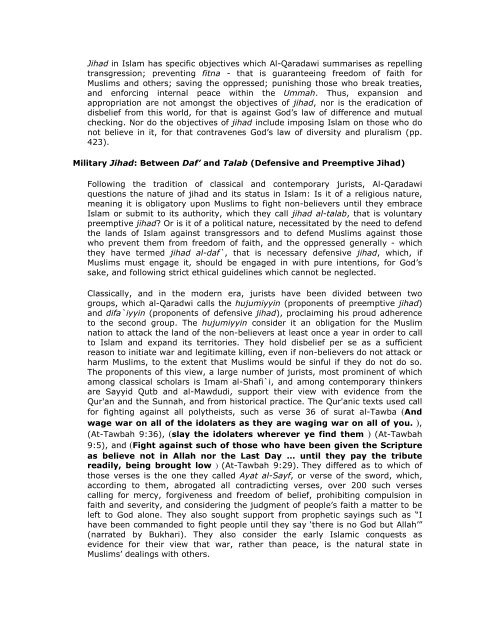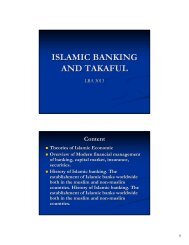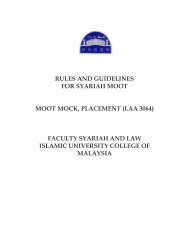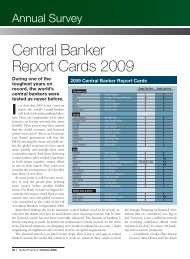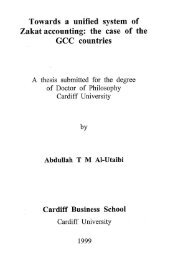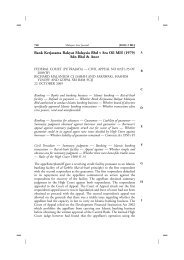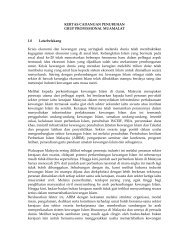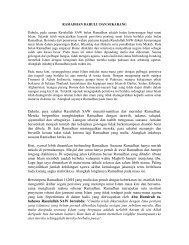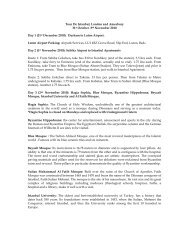Fiqh al Jihad Sheikh Yusuf al Qaradhawi
Fiqh al Jihad Sheikh Yusuf al Qaradhawi
Fiqh al Jihad Sheikh Yusuf al Qaradhawi
Create successful ePaper yourself
Turn your PDF publications into a flip-book with our unique Google optimized e-Paper software.
<strong>Jihad</strong> in Islam has specific objectives which Al-Qaradawi summarises as repelling<br />
transgression; preventing fitna - that is guaranteeing freedom of faith for<br />
Muslims and others; saving the oppressed; punishing those who break treaties,<br />
and enforcing intern<strong>al</strong> peace within the Ummah. Thus, expansion and<br />
appropriation are not amongst the objectives of jihad, nor is the eradication of<br />
disbelief from this world, for that is against God’s law of difference and mutu<strong>al</strong><br />
checking. Nor do the objectives of jihad include imposing Islam on those who do<br />
not believe in it, for that contravenes God’s law of diversity and plur<strong>al</strong>ism (pp.<br />
423).<br />
Military <strong>Jihad</strong>: Between Daf’ and T<strong>al</strong>ab (Defensive and Preemptive <strong>Jihad</strong>)<br />
Following the tradition of classic<strong>al</strong> and contemporary jurists, Al-Qaradawi<br />
questions the nature of jihad and its status in Islam: Is it of a religious nature,<br />
meaning it is obligatory upon Muslims to fight non-believers until they embrace<br />
Islam or submit to its authority, which they c<strong>al</strong>l jihad <strong>al</strong>-t<strong>al</strong>ab, that is voluntary<br />
preemptive jihad? Or is it of a politic<strong>al</strong> nature, necessitated by the need to defend<br />
the lands of Islam against transgressors and to defend Muslims against those<br />
who prevent them from freedom of faith, and the oppressed gener<strong>al</strong>ly - which<br />
they have termed jihad <strong>al</strong>-daf`, that is necessary defensive jihad, which, if<br />
Muslims must engage it, should be engaged in with pure intentions, for God’s<br />
sake, and following strict ethic<strong>al</strong> guidelines which cannot be neglected.<br />
Classic<strong>al</strong>ly, and in the modern era, jurists have been divided between two<br />
groups, which <strong>al</strong>-Qaradwi c<strong>al</strong>ls the hujumiyyin (proponents of preemptive jihad)<br />
and difa`iyyin (proponents of defensive jihad), proclaiming his proud adherence<br />
to the second group. The hujumiyyin consider it an obligation for the Muslim<br />
nation to attack the land of the non-believers at least once a year in order to c<strong>al</strong>l<br />
to Islam and expand its territories. They hold disbelief per se as a sufficient<br />
reason to initiate war and legitimate killing, even if non-believers do not attack or<br />
harm Muslims, to the extent that Muslims would be sinful if they do not do so.<br />
The proponents of this view, a large number of jurists, most prominent of which<br />
among classic<strong>al</strong> scholars is Imam <strong>al</strong>-Shafi`i, and among contemporary thinkers<br />
are Sayyid Qutb and <strong>al</strong>-Mawdudi, support their view with evidence from the<br />
Qur'an and the Sunnah, and from historic<strong>al</strong> practice. The Qur'anic texts used c<strong>al</strong>l<br />
for fighting against <strong>al</strong>l polytheists, such as verse 36 of surat <strong>al</strong>-Tawba (And<br />
wage war on <strong>al</strong>l of the idolaters as they are waging war on <strong>al</strong>l of you. ),<br />
(At-Tawbah 9:36), (slay the idolaters wherever ye find them ) (At-Tawbah<br />
9:5), and (Fight against such of those who have been given the Scripture<br />
as believe not in Allah nor the Last Day … until they pay the tribute<br />
readily, being brought low ) (At-Tawbah 9:29). They differed as to which of<br />
those verses is the one they c<strong>al</strong>led Ayat <strong>al</strong>-Sayf, or verse of the sword, which,<br />
according to them, abrogated <strong>al</strong>l contradicting verses, over 200 such verses<br />
c<strong>al</strong>ling for mercy, forgiveness and freedom of belief, prohibiting compulsion in<br />
faith and severity, and considering the judgment of people’s faith a matter to be<br />
left to God <strong>al</strong>one. They <strong>al</strong>so sought support from prophetic sayings such as “I<br />
have been commanded to fight people until they say ‘there is no God but Allah’”<br />
(narrated by Bukhari). They <strong>al</strong>so consider the early Islamic conquests as<br />
evidence for their view that war, rather than peace, is the natur<strong>al</strong> state in<br />
Muslims’ de<strong>al</strong>ings with others.


